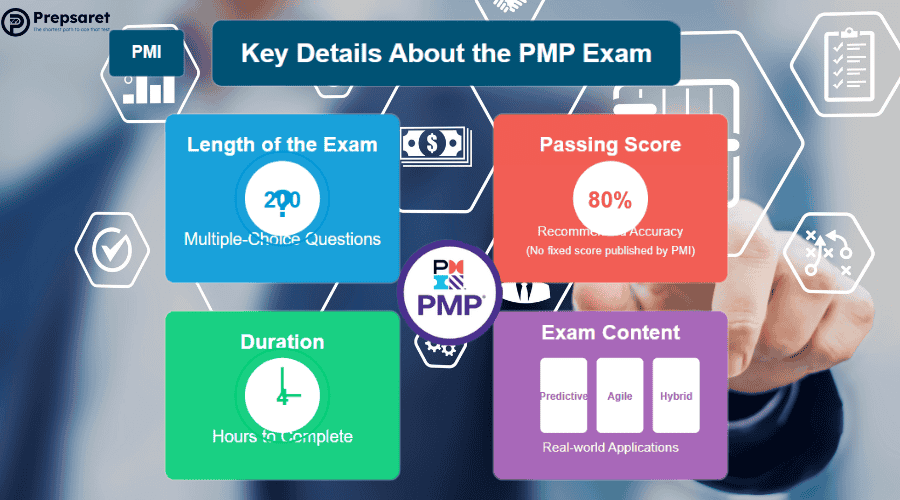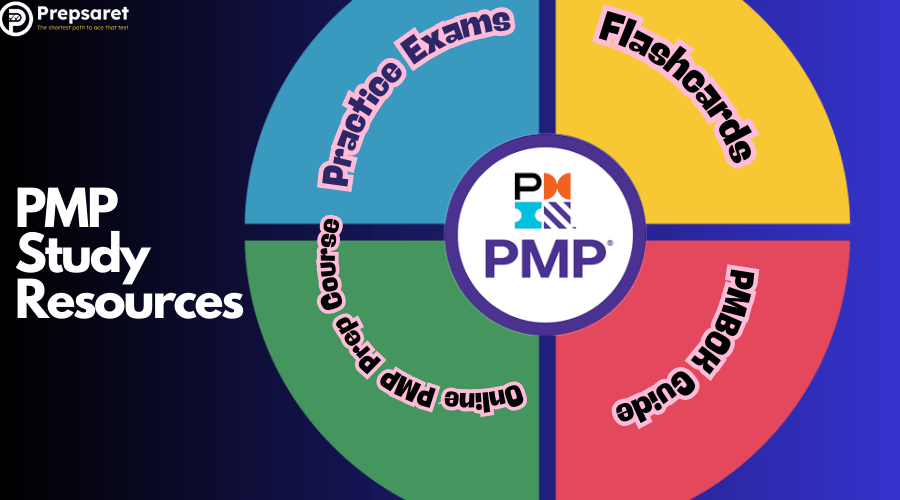If you’re ready to take the plunge into the world of project management, one of the most powerful ways to showcase your expertise is by earning your PMP certification. A solid PMP study plan is key to acing the PMP exam and ensuring your success.
The Project Management Professional (PMP) certification is a globally recognized credential that not only opens doors for career advancement but also helps you sharpen your project management skills.
In this complete guide, we’ll walk you through everything you need to know about creating a PMP study plan that guarantees PMP exam readiness and helps you pass the exam on your first attempt!
Understanding the PMP Exam and Its Requirements
Before diving into the details of the PMP study plan, let’s take a quick look at the PMP exam and its requirements. After all, knowing what you’re up against is half the battle!
What is the PMP Certification Exam?
The PMP certification is a professional credential awarded by the Project Management Institute (PMI) to individuals who demonstrate their project management expertise. It’s designed for experienced project managers who want to validate their skills and knowledge of project management profession practices, tools, and techniques.
The PMP certification exam is a comprehensive test that covers a wide range of topics. It’s broken down into different domains, such as project management knowledge, business environment, and more.
To be a senior project manager, you need to have a good grasp of the PMBOK Guide and a solid understanding of project management practices.
Key Details About the PMP Exam

- Length of the Exam: The exam consists of 200 multiple-choice questions.
- Duration: You’ll have 4 hours to complete the exam.
- Passing Score: While PMI does not publish a fixed passing score, most candidates aim for an 80% accuracy rate.
- Exam Content Outline: The exam focuses on different aspects of project management, including predictive, agile, and hybrid approaches. You’ll need to understand these methodologies and how to apply them in real-world scenarios.
- PMP Exam Dates: The PMP certification exam date is flexible. You can schedule your exam through PMI’s official website once you are eligible.
Eligibility Requirements for the PMP Exam
Before you start PMP prep, ensure you meet the eligibility criteria:
- Education: You need a four-year degree or a secondary degree (high school diploma or associate’s degree).
- Project Management Experience: If you have a four-year degree, you’ll need at least 36 months of experience leading projects. If you have a secondary degree, you’ll need 60 months.
- Project Management Education: You must complete 35 hours of project management education, which can be satisfied through PMP training providers.
With these prerequisites in place, you’re ready for PMP application and preparation!
Creating a Tailored PMP Study Plan

Now, let’s break down the steps for creating an effective PMP exam study plan that aligns with your goals and ensures you’re prepared for the exam.
Step 1: Understand the Exam Content Outline
To kick off your PMP study plan, start by reviewing the PMP exam content outline. This document, provided by PMI, outlines the key domains and tasks you’ll be tested on. These include:
- People: Managing the team and stakeholder relationships.
- Process: Planning, executing, and monitoring project processes.
- Business Environment: Aligning projects with organizational strategies.
The PMBOK Guide, or Project Management Body of Knowledge, is the go-to reference for understanding the concepts and vocabulary you need for the exam. This is where you’ll encounter terms like agile, predictive project management approaches, and other important PMP vocabulary.
Step 2: Evaluate Your Current Knowledge and Identify Gaps
Before jumping into your study plan, take a moment to assess your project management experience. Reflect on areas where you feel confident and areas where you may need improvement. Do you already understand project management practices? Are there any specific key concepts that are a bit fuzzy?
By performing this self-assessment, you’ll identify knowledge gaps and can prioritize them in your study sessions. It’s important to tackle these areas early on so that you’re not caught off guard on exam day.
Step 3: Build a Realistic Study Schedule
Creating a PMP study schedule is one of the most important elements of exam preparation. Here’s how to approach it:
- Assess Your Time: Consider your busy schedule and determine how much time you can realistically devote to studying each week. Aim for at least 2-3 hours a day for 8-12 weeks, depending on your experience level.
- Set Specific Goals: Break down the topics from the exam content outline into weekly or daily study goals. This will help you stay focused and ensure that you cover all areas in detail.
- Track Your Progress: Use tools like Google Sheets or apps to track your progress. Check off topics as you complete them to visualize your success!
Step 4: Choose the Right Study Materials and Resources

Selecting the right study materials is crucial for your PMP preparation. Here’s what you’ll need:
- PMBOK Guide: This is the core reference for your study plan.
- PMP Practice Exams: Taking practice exams helps familiarize you with the exam format and question types. Sites like Prepsaret provide high-quality practice exams that closely resemble the actual certification exam.
- Online Courses: Consider enrolling in PMP training or online courses from trusted PMP training providers. These courses often offer structured content and expert guidance.
- Reference Materials: Besides the PMBOK Guide, refer to books, online forums, and study groups to deepen your understanding.
Step 5: Incorporate Practice Exams
Simulated PMP practice exams are an essential part of any PMP study plan. These exams help you get a feel for the timing, question formats, and overall structure of the actual exam. They also highlight areas where you may still have knowledge gaps.
Here’s how to use practice exams effectively:
- Simulate Exam Day: Set aside time to take full-length practice exams under exam-like conditions. This will help you manage your time and build your PMP exam readiness.
- Analyze Results: Review your answers carefully. For each wrong answer, study the material related to that question until you fully understand it.
- Repeat: Taking multiple practice exams is key to reinforcing your knowledge and boosting your confidence.
Step 6: Join a Study Group or Community
Studying alone can be overwhelming, but joining a study group or community can make a big difference. Whether it’s an online forum or a local study group like PMP study group on Facebook, collaborating with other PMP aspirants will keep you motivated and provide you with fresh insights.
In addition, interacting with other students allows you to discuss complex concepts, share exam prep tips, and provide mutual support. You’ll be amazed at how much you can learn from others’ study techniques!
Why Choose Prepsaret for Your PMP Exam Preparation
As you prepare for your PMP exam, Prepsaret stands out as an excellent online PMP test prep resource to help you achieve your certification. Here’s why:
- Customizable Study Plans: Prepsaret allows you to tailor your study plan to suit your learning style and goals. Whether you prefer visual aids, practice questions, or structured lessons, Prepsaret provides flexibility in how you learn.
- PMP Practice Exams: One of the most effective ways to prepare is through PMP practice exams. Prepsaret offers practice exams that closely mimic the real exam, with detailed explanations of correct answers and detailed explanations of incorrect answers to help you and reinforce key concepts.
- Comprehensive Lessons: Prepsaret’s courses cover all domains of the PMP exam, from predictive to agile approaches. This ensures you’re well-prepared for every part of the exam, providing in-depth knowledge and clarity on project management practices.
- Flexibility: Prepsaret caters to a variety of learning styles and budgets, offering multiple study options to fit your needs. Whether you prefer a more structured approach or a realistic schedule, Prepsaret accommodates both.
Many PMP students have used Prepsaret and successfully passed their exam on their first attempt. By leveraging Prepsaret’s comprehensive resources, you can boost your PMP exam readiness and set yourself up for success.
With Prepsaret, you’re not just studying for an exam—you’re preparing for a significant achievement in your project management career!
Key Strategies for Effective PMP Exam Preparation
Now that you’ve created a solid PMP study plan, let’s dive into some study techniques strategies that will ensure your PMP exam preparation success.
Time Management Techniques for Studying
Effective time management is a game-changer when it comes to preparing for your PMP exam. Here are some tried-and-true strategies:
- Break your study sessions into manageable chunks: Try studying for about 45 minutes followed by a 15-minute break. This helps maintain focus and prevents burnout.
- Prioritize tough topics: Tackle the hardest subjects early in your study schedule when your mind is fresh. Topics like project management practices and PMP vocabulary can be challenging, so start with those.
- Consistency is key: Regular study sessions are far more effective than cramming all at once. Set aside specific times each day for PMP exam preparation and stick to it.
Mastering Key PMP Concepts and Vocabulary
One of the biggest hurdles in the PMP exam is mastering the specialized PMP vocabulary and understanding core project management concepts. Here are some tips to help:
- Use flashcards, mind maps, or diagrams to reinforce your learning. Visual aids are particularly helpful for memorizing terms and concepts.
- Don’t just memorize—understand how each term and concept fits into the broader scope of project management. This will help you when answering exam questions on complex topics like predictive project management approaches and agile or hybrid approaches.
Effective Exam Day Strategies

On exam day, staying calm and collected is crucial. Here are a few strategies to help you stay focused:
- Get plenty of rest the night before. You’ll need all the energy and focus you can muster.
- Arrive early at the exam center to settle in and review your own notes briefly. This can help calm your nerves.
- Once you’re in the exam, stay calm, read each PMP exam question carefully, and avoid rushing through the test. Taking your time ensures you understand and answer each question accurately.
By following these strategies, you’ll be well on your way to PMP exam success and achieving your PMP certification.
Read also: How to Prepare for the PMP Exam
Common Mistakes to Avoid During PMP Exam Preparation
Preparing for the PMP exam can be overwhelming, but avoiding these common mistakes will help you stay on track and improve your chances of success:
- Over-Reliance on Single Resources: One of the biggest mistakes is sticking to just one study guide or resource. While it’s tempting to rely on one source, diversifying your study materials ensures a well-rounded approach. Use different types of study aids, such as practice exams, online courses, and PMP training providers to reinforce your understanding across all exam domains.
- Skipping Practice Exams: Skipping PMP practice exams is a major mistake. Skipping PMP practice exams can lead to being ill-prepared for the PMP certification exam. These exams simulate the PMP certification exam and provide valuable feedback. They help you get familiar with the exam format, time management, and the types of exam questions you’ll encounter. Practicing regularly will improve your PMP exam readiness and help you pinpoint areas where you may need further study.
- Underestimating Key Concepts: Don’t underestimate the importance of covering all key areas of the PMP exam content outline. Every domain—whether it’s project management knowledge, project management practices, or PMP vocabulary—is essential. Neglecting any key concept can leave you unprepared for exam questions that might seem unfamiliar.
It’s critical to review each section thoroughly and address any knowledge gaps before the exam.
Read also: PMP Study Resources
Prepsaret vs. Other PMP Study Resources
When it comes to PMP exam preparation, choosing the right study resource is crucial. Prepsaret stands out among other PMP training providers for several key reasons:
- Interactive Features: Prepsaret offers over 500 PMP practice questions with detailed explanations, helping you reinforce key concepts and ensuring you’re fully prepared for the PMP certification exam.
- Comprehensive Coverage: Unlike free resources, Prepsaret provides a well-structured study plan that covers all PMP exam domains, offering a complete guide for your preparation.
- Complete Study Guide: Prepsaret’s structured approach ensures you don’t miss any important areas. It helps you stay on track and focused on achieving PMP exam success.
- Investment in Success: For PMP aspirants aiming for first-time success, Prepsaret is a valuable investment. It provides PMP exam preparation tools and resources that go beyond basic content.
Prepsaret gives you the tools to confidently approach your exam with a clear study plan, practice exams, and expert explanations. Whether you’re aiming for PMP exam readiness or seeking detailed exam prep, Prepsaret is your key to PMP exam success.
FAQs About PMP Study Plan
What is the Best Way to Study for PMP?
The best way to study for PMP exam preparation is to develop a structured study plan. Combine PMP study materials, practice exams, and online courses. Consistency, focusing on key concepts, and using a variety of resources will help solidify your PMP exam readiness.
Can I Pass PMP in 3 Months?
Yes, passing the Project Management Professional (PMP) certification exam in 3 months is achievable if you follow a focused study plan. Dedicate time to understand the PMP exam domains, complete practice exams, and review your PMP certification study plan to ensure comprehensive preparation.
Can You Prepare for PMP in 1 Month?
It’s challenging to prepare for the PMP exam in just 1 month. However, if you have substantial project management experience, you might pass. Prioritize practice questions, focus on key concepts, and make sure your PMP study plan is realistic to maximize your chances.
Your Path to PMP Certification!
Achieving PMP certification is a rewarding journey, but it requires a structured approach. Start by crafting a PMP certification study plan that aligns with your goals and learning style.
Using resources like Prepsaret can provide you with valuable practice exams, study materials, and PMP training to sharpen your knowledge.
Stay consistent with your PMP study schedule to ensure you’re well-prepared for the PMP exam. With dedication and the right resources, you can confidently move toward PMP exam success and unlock new career opportunities. Good luck on your PMP certification journey!

